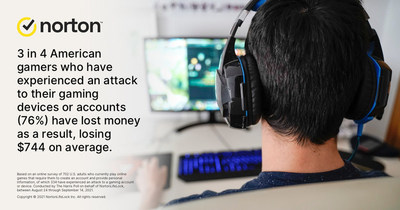BigCheeseKIT
Norton Special Report Reveals Nearly 1 in 2 Gamers Have Experienced a Cyberattack

NortonLifeLock, a global leader in consumer Cyber Safety, has published the findings of a global study that sheds light on the cyber risks impacting the gaming community.
The 2021 Norton Cyber Safety Insights Report: Special Release – Gaming & Cybercrime, conducted by The Harris Poll among more than 700 American adults who currently play online games, found that almost half of American gamers (47%) have experienced a cyberattack to their gaming account or device. Of those, more than three in four (76%) report that they were financially affected as a result, losing a striking $744 on average.
The study also uncovered surprising findings about gamer-to-gamer cyber risks and the great lengths gamers are willing to go to win. Nearly one in four (23%) U.S. gamers are likely to hack into the gaming account of a friend, family member, or romantic partner if they knew it would give them a competitive advantage in an online game. This sentiment is more pronounced among hardcore gamers in the US, with two in five (42%) agreeing, underscoring serious gamers’ tenacious determination to win.
“These findings are jarring, but there are some gamers out there that will do whatever it takes to win. I’ve learned that when you’re gaming online, it’s so important to be mindful of who you are friends with online and what information you share. While this is especially true for professional gamers who have that public profile, it’s clear this goes for any online gamer,” BigCheeseKIT, gamer and Twitch streamer, said.
The competitive drive extends across all types of gamers in the US, from casual to hardcore gamers. If they knew it would secure a competitive advantage, about one in four American gamers are likely to exploit a loophole or bug in a game (27%), pay to take possession of another user’s gaming account (25%), install cheats to their own gaming account or devices (24%), or hack into the gaming account of a random person (24%).
“Cheats, trainers and exploits can be incredibly alluring for driven gamers. Scammers know this and will often try to trick gamers into clicking phishing links or downloading malware by touting limited edition items or secret cheat codes that promise to give a competitive boost. If the scam works, gamers might lose their gaming profile, digital assets or personal information. The real competitive advantage is having strong security protection that can thwart these threats and keep gamers in the game,” Darren Shou, Head of Technology at NortonLifeLock, said.
In partnership with The Harris Poll, the report surveyed over 5300 adults ages 18+ across 8 countries1, including 702 U.S. adults, to explore the Cyber Safety risks gamers face and their online security attitudes and behaviors.
Powered by WPeMatico
-

 Amusnet5 days ago
Amusnet5 days agoWeek 7/2026 slot games releases
-

 Aphrodite’s Kiss5 days ago
Aphrodite’s Kiss5 days agoLove on the Reels: Slotland Introduces “Aphrodite’s Kiss”
-

 Latest News7 days ago
Latest News7 days agoWinSpirit’s UnValentine’s Day: A New Take on February Engagement
-

 Denmark6 days ago
Denmark6 days agoRoyalCasino Partners with ScatterKings for Company’s Danish Launch
-

 Booming Games6 days ago
Booming Games6 days agoTreasure Hunt Revival — Booming Games Launches Gold Gold Gold Hold and Win
-

 Baltics6 days ago
Baltics6 days agoEstonia to Reinstate 5.5% Online Gambling Tax From March 1
-

 ELA Games6 days ago
ELA Games6 days agoELA Games Unveils Tea Party of Fortune — A Magical Multiplier Experience
-

 Brino Games5 days ago
Brino Games5 days agoQTech Games integrates more creative content from Brino Games



















